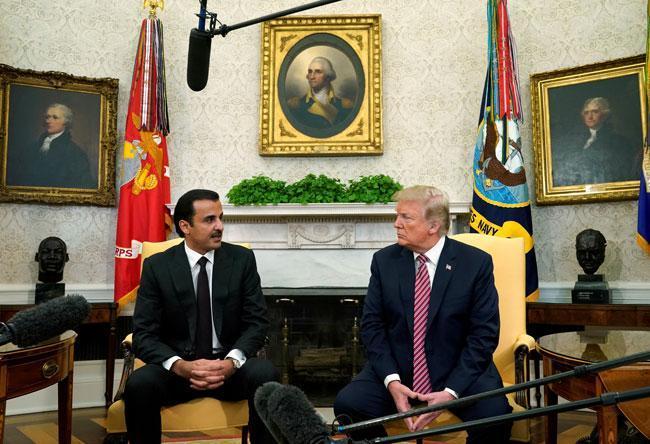Trump welcomes Qatari Emir in from the cold
WASHINGTON

U.S. President Donald Trump welcomed the Emir of Qatar to the White House on April 10, barely one year after alleging his government funded terrorism at a “high level.”
Drawing a line under a spat that called into question the future of a key US air base in the Gulf State, Trump hosted Emir Tamim bin Hamad Al-Thani in the Oval Office.
“He’s a friend of mine” Trump said effusively. “He’s a great gentleman.”
A readout of the meeting issued later by the White House said “the leaders discussed joint efforts to finalize new commercial deals that would create more than 50,000 American jobs” in addition to discussing Syria and “Iranian and Russian malign influence” there.
It did not elaborate on the nature of the commercial ventures.
A year ago the picture was very different. Trump had followed the lead of Saudi Arabia and the United Arab Emirates in taking a hard line against Qatar, saying the country needed to scale back ties with Iran and stop funding extremism.
Qatar’s neighbors had also been infuriated by its willingness to host dissidents from across the Gulf and to allow broadcasts critical of them by Doha-based Al Jazeera.
Trump had initially supported an economic blockade on Qatar, but aides - mindful of the pivotal role that the Al Udeid Air Base outside Doha plays in U.S. Middle East operations - have since convinced him to take a more moderate approach
The Emir said Trump “has been very helpful in supporting us during this blockade,” and thanked the American people for being “very supportive.”
“We do not and we will not tolerate people who fund terrorism. We are cooperating with the United States of America to stop funding of terrorism around the region.”
Trump praised Qatar’s military purchases, saying they buy “a lot of equipment from us, a lot of military airplanes, missiles.”
The pair also “discussed obstacles to restoring unity in the Gulf Cooperation Council,” the statement added, a clear reference to the diplomatic feud between Qatar and Saudi Arabia, the UAE, Bahrain and Egypt.
















